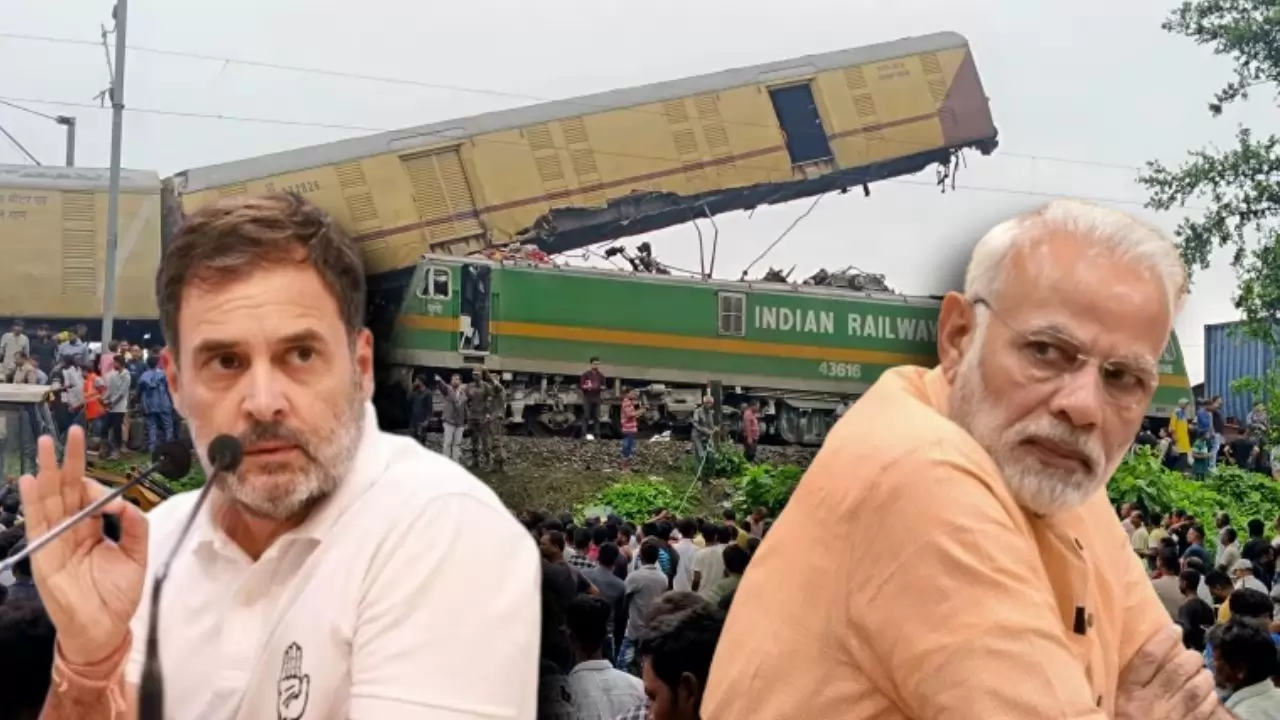
X
New Delhi: The recent tragic derailment of the Kanchenjunga Express in Siliguri, which claimed nine lives, has once again highlighted the enduring issue of train accidents in India. This incident has ignited political debate, with the Congress party criticizing the ruling Bharatiya Janata Party (BJP) for its handling of railway safety. The Congress, which made unexpected gains in the 2024 Lok Sabha elections, used this tragedy to question Prime Minister Narendra Modi's political capabilities and the effectiveness of his policies in ensuring railway safety.
In a video posted on their official X (formerly Twitter) handle, the Congress party sharply criticized the Modi administration, alleging that his political policies have resulted in a poor railway safety record. The video highlighted alarming statistics, stating that India has witnessed an average of 11 train accidents every month, leading to significant loss of life and property.
Over 11 train accidents every month, since 2014.
— Congress (@INCIndia) June 18, 2024
Will there be no accountability? pic.twitter.com/K58s0hjDX9
The Congress's critique is aimed at holding the ruling government accountable for these frequent accidents and questioning the measures taken to prevent such tragedies. They argue that the current administration's approach to railway safety has been inadequate, leading to devastating consequences for countless families.
Supporters of the BJP, however, have responded by presenting comparative data from the previous Congress-led United Progressive Alliance (UPA) government. According to their records, there were over 1,711 train accidents during the UPA's tenure from 2004 to 2014, resulting in more than 2,453 deaths. In contrast, under the BJP-led National Democratic Alliance (NDA) government, the number of accidents has decreased to 678, with 781 deaths reported.
Were there ZERO train accidents before 2014 ?
— PallaviCT (Modi Ka Parivar) (@pallavict) June 18, 2024
How many railway ministers of UPA resigned because of serious railway accidents?
Yes, accountability needs to be FIXED
Who will FIX accountability for the Shehzada who lead party to 3 train wrecks of electoral campaigns in 3… pic.twitter.com/mGcLq9FLPh
This data suggests an improvement in railway safety under the current government, although the issue remains far from resolved. Additionally, BJP supporters have pointed out the substantial increase in safety expenditure, with the UPA government spending Rs. 1.64 lakh crore from 2004 to 2014, while the Modi administration has invested over Rs. 8.26 lakh crore in the past decade.
Do you know your history ?! pic.twitter.com/RYEnwNG5Ev
— The Common Man (@BhaaratPatri0t) June 18, 2024
The scale of recent train accidents in India is indeed concerning. The most significant rail tragedy in nearly two decades occurred in June 2023, when three trains collided in Balasore, Odisha. This catastrophic incident resulted in 296 fatalities and over 1,200 injuries, underscoring the urgent need for enhanced railway safety measures.
Historical data further illustrates the gravity of the situation. Between 1960-1961 and 1970-1971, India experienced 11,312 derailments out of 14,769 train incidents. The National Crime Records Bureau of India reported 1,852 injuries and 16,431 deaths due to railway accidents in 2021 alone. A staggering 67.7% of these accidents were caused by falls from trains or collisions with individuals on the tracks.
The debate over railway safety in India highlights the need for accountability and effective measures to prevent such tragedies. While political parties exchange blame and compare records, the primary concern should remain the safety and well-being of passengers. The data indicates some progress under the current administration, but the frequency and severity of train accidents still demand comprehensive and sustained efforts to ensure safer railway operations.
Investments in infrastructure, advanced safety technologies, and rigorous maintenance protocols are crucial to preventing future accidents. Additionally, public awareness campaigns and stricter enforcement of safety regulations can play a significant role in reducing fatalities and injuries on India's vast railway network. As India mourns the victims of the Kanchenjunga Express tragedy and other recent accidents, the nation must come together to prioritize railway safety and work towards a future where such incidents become a rarity rather than a persistent issue.





Copyright © 2026 Top Indian News
